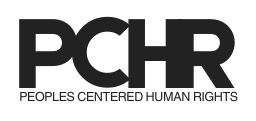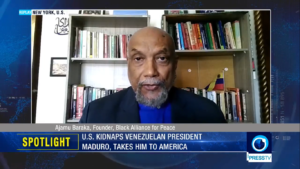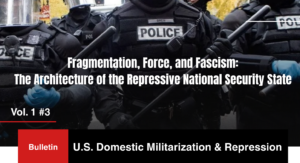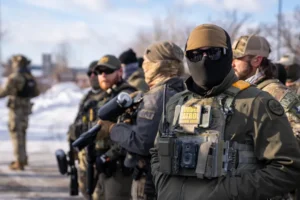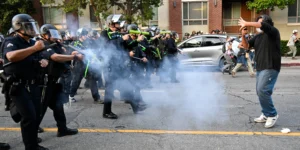FIFA is a Collaborator in...
Read More“Decolonizing Human Rights for Human Liberation”
North-South Project for
People(s)-Centered
Human Rights
“Decolonizing Human Rights for Human Liberation”
North-South Project for People(s)-Centered Human Rights
Mission
La Misión
El Proyecto Norte-Sur para los Derechos Humanos Centrados en las Personas (el Proyecto) contribuirá a la construcción de un marco alternativo de derechos humanos que esté liberado del aparato liberal, individualista, legalista y centrado en el estado que surgió al concluir la Segunda Guerra Mundial como un régimen de derechos humanos “occidental” que se convirtió, y sigue siendo, una herramienta conservadora para imponer los intereses geopolíticos del imperialismo occidental. El genocidio apoyado por Occidente en Gaza y la continua anexión de la ocupación en Cisjordania han agudizado las contradicciones irreconciliables del proyecto de derechos humanos occidental, lo que ha resultado en la crisis de legitimidad que está experimentando en la actualidad. Al rechazar la mistificación ideológica de un marco de derechos humanos neutral y objetivo, el Proyecto, a través de actividades educativas, la construcción de estructuras cooperativas transnacionales y el apoyo a las luchas populares, vinculará a comunidades, clases y “pueblos” oprimidos del Norte y Sur Global que están avanzando hacia el desarrollo de movimientos comprometidos con luchas nacionales y globales anticapitalistas, decoloniales y antiimperialistas por la justicia social, la sostenibilidad ecológica, la liberación nacional y la autodeterminación auténtica.
What is People(s)-Centered Human Rights?
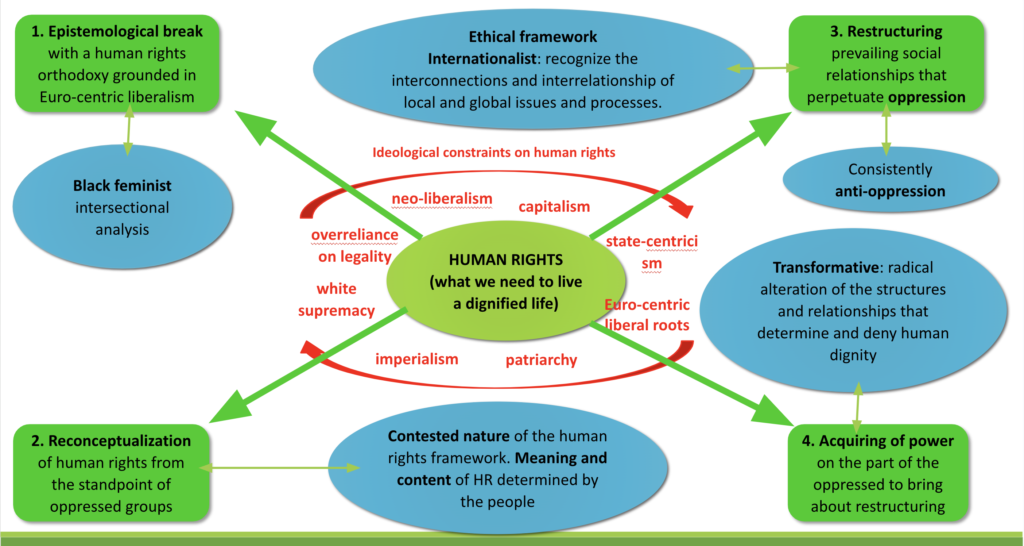
People(s)-Centered Human Rights (PCHR) are those non-oppressive rights that reflect the highest commitment to universal human dignity and social justice that individuals and collectives define and secure for themselves and Collective Humanity through social struggle.
This definition is a description of a process and an ethical framework as opposed to a pre-figured list of items defined as representing human rights. This is one of the key differences between the liberal framework and PCHR. PCHR’s approach asserts that human rights must be created from the bottom-up.
PCHR’s approach to human rights activism does not limit itself to a national legal regime or to the normative standards reflected in international human rights treaties, covenants or declarations. While this approach recognizes the importance of these texts and the legal and ethical principles implied in them, the ultimate meaning of the language in the texts, the scope of rights that will be recognized, and the modalities for rights implementation, are an evolving process whose final determination is dependent on popular political struggles and societal dispensations of power. De-linked from the bias and partial ontology of classical liberalism—and grounded in the racist, sexist and classist pretentions of natural law and presumptuousness of its universality—the content and teleology of human rights becomes an area of contention itself.
This is not to say that the people-centered approach lacks a “foundation” or source of legitimacy—nor is it arguing for moral relativity. The approach simply recognizes a different foundation, source of legitimacy and moral authority – that of the people’s positive struggle for social justice. Therefore, the “people” in struggle, with an understanding that the construction of the “people” is a political process informed by specific national realities, the PCHR’s approach eschews the legalistic and morally vacuous debates around “collective rights” and the “justiciability” of economic, social and cultural rights, while real live “collectives” (peoples) are starving; losing lands to transnational corporations, being denied the right to speak their languages, or having their leaders killed. The “universal” norms that a people-centered process would reflect would be grounded in and guided by the needs and aspirations of the people.
This is the Black Radical Tradition’s approach to human rights. It is an approach that views human rights as an arena of struggle that, when grounded and informed by the needs and aspirations of the oppressed, becomes part of a unified comprehensive strategy for de- colonization and radical social change.
PCHR’s framework provides an alternative and theoretical and practical break with the race and class-bound liberalism and mechanistic state-centered legalism that informs mainstream human rights.
The people-centered framework proceeds from the assumption that the genesis of the assaults on human dignity, which are at the core of human rights violations, is located in the relationships of oppression. The PCHR framework does not pretend to be non-political. It is a political project in the service of the oppressed. It names the main enemies of human dignity and rights: the Pan European white supremacist, colonial/capitalist patriarchy and all forms of human oppression that flow this material reality.
Therefore, the realization of authentic freedom and human dignity can only come about as a result of the radical alteration of the structures and relationships that determine and often deny human dignity. In other words, it is only through social revolution that human rights can be realized.
The demands for clean water and clean air; accessible and healthy food; free quality education; healthcare and healthiness for all; housing; public transportation; family sustaining wages and socially productive employment that allow for a dignified life; ending of mass incarceration; universal free child care; opposition to war and the control and eventual elimination of the police; self-determination; and respect for democracy in all aspects of life are some of the people-centered human rights that can only be realized through a bottom-up mass movement for building popular power.
By shifting the center of human rights struggle away from advocacy to struggle, Malcolm laid the foundation for a more relevant form of human rights struggle for people still caught in the tentacles of Euro-American colonial dominance. The PCHR approach that creates human rights from the bottom-up views human rights as an arena of struggle. Human rights do not emanate from legalistic texts negotiated by states—they must develop out of and reflect the aspirations of the people. Unlike the liberal conception of human rights that elevates some mystical notions of natural law (which is really bourgeois law) as the foundation of rights, the “people” in formation are the ethical foundation and source of PCHRs.
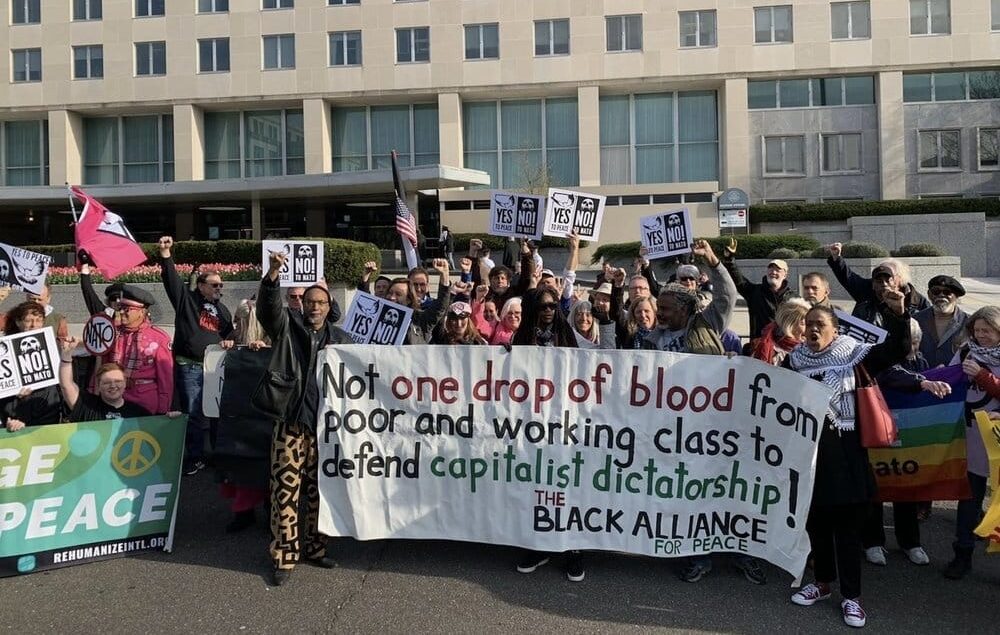
Despite what proponents of the Western “human rights” regime proclaim, the human rights idea is not innocent. This notion of human rights emerged as an aspect of classical liberalism at a particular historical moment in Europe informed by the internal class/social struggles and the colonialist expansion of various European powers. While classical European liberalism professed a fidelity to the “rights of man” and the proclamation that all “men” are equal, it simultaneously provided philosophical justifications for slavery, genocide, settler colonialism, capitalism, patriarchy and imperialism – systems that degrade, dominate, destroy, and systemically oppress human subjects.
The systematic degradation, dehumanization and murder of Palestinians with the full support of the “collective West,” is a graphic example the moral dualism of the white supremacist Western project.
How has liberalism been able to achieve this? Because at the heart of the liberal project are exclusionary criteria for those who deserve to have rights – that tragically for millions of people during the last 500 years of European dominance, rest on a stratification of humanity in which Europeans and their civilizational project is at the apex. It is that internal moral contradiction that explains how Thomas Jefferson could speak of fundamental equality while holding slaves, raping Black women, and facilitating the genocide of, and brutal land theft from Indigenous peoples; how Winston Churchill could call for self-determination of nations while maintaining a colonial empire; how U.S. authorities can justify kidnapping and assassination even of U.S. citizens and the invasions of States, all in the name of fighting Islamic terrorists; and how war can be employed in the name of “humanitarian intervention” and the “responsibility to protect” but is ignored when Palestinians face a genocide.
Therefore, for social justice activists around the world, but particularly in the global South, it was precisely these moral contradictions by both Western and non-Western states that created deep dissatisfaction and mistrust of human rights as an instrument for radical social change. It appears to many of these activists that the orthodox framework is not able to offer any more than bland reforms and a depoliticized politics.
In response to the human rights crisis of relevance, a “people(s)-centered human rights” concept and approach has been developing from the margins of the U.S. human rights movement over the last few years. Introduced in 2004 by Ajamu Baraka, human rights activist and co-founder of the Black Alliance for Peace, the PCHRs framework is informed by the African American radical human rights tradition and recognizes the contingent and contested nature of human rights framework. The modern expression of PCHR developed out of the organizing and agitation directed at the newly formed United Nations between 1945 and 1951 and subsequently taken up by figures like Malcolm X and elements of the radical Black anti-colonial, revolutionary movements in the 1960s. This tradition of human rights struggle combined the struggle against white supremacy and anti-colonialism with a commitment to domestic and global systemic transformation. As a political project historically and socially grounded in the needs and realities of oppressed communities and peoples and committed to social justice and the development of the people as autonomous political subjects, it rejects the mystification of the supposedly non-political, universalist perspective and practice of human rights.
There was something quite different with Malcolm’s approach to human rights that distinguished him from mainstream civil rights activists. By grounding himself in the radical human rights approach, Malcolm articulated a position on human rights struggle that did not contain itself to just advocacy. He understood that appealing to the same powers that were responsible for the structures of oppression was a dead end. Those kinds of unwise and potentially reactionary appeals would never result in substantial structural changes. Malcolm understood oppressed peoples must commit themselves to radical political struggle in order to advance a dignified approach to human rights.
“We have to make the world see that the problem that we’re confronted with is a problem for humanity. It’s not a Negro problem; it’s not an American problem. You and I have to make it a world problem, make the world aware that there’ll be no peace on this earth as long as our human rights are being violated in America.”
And if the U.S. and the international community does not address the human rights plight of the African American, Malcolm is clear on the course of action: “If we can’t be recognized and respected as a human being, we have to create a situation where no human being will enjoy life, liberty, and the pursuit of happiness.”
Malcolm’s approach to the realization of human rights was one in which human agency is at the center. If oppressed individuals are not willing to fight for their human rights, Malcolm suggested that “you should be kept in the cotton patch where you’re not a human being.”
If you are not ready to pay the price required to experience full dignity as a person and as members of a self-determinant people, then you will be consigned to the “zone of non-being,” as Franz Fanon refers to that place where the non-European is assigned. Malcolm referred to that zone as a place where one is a sub-human:
“You’re an animal that belongs in the cotton patch like a horse and a cow, or a chicken or a possum, if you’re not ready to pay the price that is necessary to be paid for recognition and respect as a human being.
“And what is that price?
“The price to make others respect your human rights is death. You have to be ready to die… it’s time for you and me now to let the world know how peaceful we are, how well-meaning we are, how law-abiding we wish to be. But at the same time, we have to let the same world know we’ll blow their world sky-high if we’re not respected and recognized and treated the same as other human beings are treated.”
In the contemporary period, PCHR advocates continue that approach but with an even more explicit focus on naming the main enemy of human rights – the Pan European White Supremacist, Colonial/capitalist patriarchy.
The United States settler state was established by the violent theft of Indigenous land through conquest and the importation of enslaved Africans who were forced to provide free labor using systematic, unspeakable physical violence such as lynching, rape, race riots, torture and murders by police forces.
These forms of violence constituted the method by which structures of settler colonialism, white supremacy and racial capitalism were established, reproduced and thrived and are the methods by which the U.S. capitalist state maintains its dominance globally using military interventions to control the labor, land natural resources, and the collective wealth of the vast majority of the world’s peoples.
Baraka, A. (Feb. 21, 2024). “People Centered Human Rights and the Black Radical Tradition.”
https://www.blackagendareport.com/people-centered-human-rights-and-black-radical-tradition-0
Baraka, A. (2023). “Praxis from the Centre Back to the Margins: Amilcar Cabral’s Method as a Guide for Reconstructing the Radical Black Political Subject.” In F. Manji & B. Fletcher’s, Second revised edition, In Claim No Easy Victories: The Legacy of Amilcar Cabral. Brooklyn, NY: Common Notions Press. Pp. 375-382.
https://darajapress.com/publication/claim-no-easy-victories-the-legacy-of-amilcar-cabral-new-expanded-edtion
Baraka, A. (May 18, 2021). “From Palestine to Colombia: The End of the White World Colonial-Capitalist Project?”
https://towardfreedom.org/americas-2/from-palestine-to-colombia-the-end-of-the-white-world-colonial-capitalist-project/
Baraka, A. (2019). Forward. “Countering the Violence of Imposed Forgetting.” In R. Sirvent & D. Haiphong edition, American Exceptionalism and American Innocence: A People’s History of Fake News―From the Revolutionary War to the War on Terror. NY: Skyhorse Publishing.
https://www.skyhorsepublishing.com/9781510742369/american-exceptionalism-and-american-innocence/
Baraka, A. (2018). “Forward.” In F. Jerome’s edition, The Einstein File: The FBI’s Secret War Against the World’s Most Famous Scientist. Montreal, Quebec: Baraka Books.
The Einstein File: The FBI’s Secret War Against the World’s Most Famous Scientist on Amazon.com
[This book has several foreign language editions, which include Farsi/Persian, German, French, and Spanish]
Baraka, A. (Dec. 10, 2018). “The Universal Declaration of Human Rights at 70: Time to De-Colonize Human Rights!” Independent Political Report,
https://independentpoliticalreport.com/2018/12/the-universal-declaration-of-human-rights-at-70-time-to-de-colonize-human-rights/
Baraka, A. (2017). Afterword: “Home Isn’t Always Where the Hatred Is: There is Hope In Mississippi.” In K. Akuno & M. Meyer’s edition, Jackson Rising Redux: Lessons on Building the Future in the Present. Oakland, CA: PM Press.
https://pmpress.org/index.php?l=product_detail&p=1188
[This book has a foreign language edition. It is published with a Spanish publication out of Barcelona, Spain].
Baraka, A. (April 1, 2015). “Invading Yemen: Criminality in Support of Hegemony.” Guardian (Sydney), ISSN (PRINT): 1325-295X, Issue No. 1679.
https://search.informit.org/doi/abs/10.3316/informit.142937652937383
Baraka, A. (April. 29, 2015). “Baltimore and the Human Right to Resistance.” Counterpunch, https://www.counterpunch.org/2015/04/29/baltimore-and-the-human-right-to-resistance-2/
Baraka, A. (2014). “Socialism is the Highest Expression of Human Rights.” F. Goldin, D. Smith, & M. Smith’s edition, Imagine Living in a Socialist U.S.A. Pp. 71-76. NY: HarperCollins.
https://www.barnesandnoble.com/w/imagine-frances-goldin/1115888725?ean=9780062305589
Baraka, A. (2014). “For a National Alliance for Racial Justice and Human Rights.” In K. A. Gray, J. St. Clair, J. Wypijewski’s edition, Killing Trayvons: An Anthology of American Violence. Petrolia, CA: CounterPunch Books. Pp. 121-124.
https://www.barnesandnoble.com/w/killing-trayvons-jeffrey-st-clair/1121606216?ean=9780692213995
Baraka, A. (2013). “Trayvon Martin and the Need for an Independent Human Rights Movement.” Proudflesh: New African Journal of Culture, Politics and Consciousness, Issue No. 7. ISSN: 1543-0855. https://www.africaknowledgeproject.org/index.php/proudflesh/article/view/1747/0
Baraka, A. (June 20. 2013). “The Empire’s New Clothes: Humanitarian Intervention Stripped Bare,” https://fpif.org/the_empires_new_clothes_humanitarian_intervention_stripped_bare/
Baraka, A. (Sept 5. 2013), “Humanitarian Intervention: The Gift that Keeps on Giving to U.S. Imperialism,” https://fpif.org/humanitarian-intervention-gift-keeps-giving-u-s-imperialism/
Baraka, A. (Dec 11. 2013). “The Need for an Ethical and Political De-Colonization of Human Rights,” https://www.counterpunch.org/2013/12/11/the-need-for-an-ethical-and-political-de-colonization-of-human-rights/
Baraka, A. (Dec. 10, 2013). “Human Rights Project Determined by the Needs of the Powerful.”
https://fpif.org/human-rights-project-determined-needs-powerful/
Baraka, A. (Sept. 27, 2012). “Human Rights and Humanitarian Imperialism in Syria: A View from an African American Human Rights Defenders.” Pambazuka Issue 599.
https://www.wrongkindofgreen.org/2012.09/30/human-rights-and-humanitarian-imperialism-in-
Lusane, C. (2004). “Changing (Dis)Course: Mainstreaming Human Rights in the Struggle Against U.S. Racism,” The Black Scholar, Vol. 34, No. 3, BLACK POLITICS 2004 (FALL 2004), pp. 21-33 (13 pages) Published By: Taylor & Francis, Ltd.
¿Que son los Derechos Humanos Centrados en las Personas?

Los Derechos Humanos Centrados en las Personas (PCHR, por sus siglas en inglés) son aquellos derechos no opresivos que reflejan el más alto compromiso con la dignidad humana universal y la justicia social, los cuales los individuos y colectivos definen y aseguran para sí mismos y para la Humanidad Colectiva a través de la lucha social.
Esta definición es una descripción de un proceso y un marco ético, a diferencia de una lista prefigurada de elementos definidos como representativos de los derechos humanos. Esta es una de las diferencias clave entre el marco liberal y el enfoque de PCHR. El enfoque de PCHR afirma que los Derechos Humanos deben ser creados desde abajo hacia arriba.
El enfoque de PCHR hacia el activismo de derechos humanos no se limita a un régimen legal nacional ni a los estándares normativos reflejados en tratados, pactos o declaraciones internacionales de derechos humanos. Si bien este enfoque reconoce la importancia de estos textos y los principios legales y éticos implícitos en ellos, el significado final del lenguaje en estos textos, el alcance de los derechos que serán reconocidos y las modalidades para la implementación de los derechos, son un proceso evolutivo cuya determinación final depende de las luchas políticas populares y las disposiciones sociales de poder. Desvinculado del sesgo y la ontología parcial del liberalismo clásico—y arraigado en las pretensiones racistas, sexistas y clasistas del derecho natural y su presunción de universalidad—el contenido y la teleología de los derechos humanos se convierten en un área de contención en sí misma.
Esto no significa que el enfoque centrado en las personas carezca de una “fundamentación” o fuente de legitimidad—ni está argumentando a favor de la relatividad moral. El enfoque simplemente reconoce una base diferente, una fuente de legitimidad y autoridad moral: la lucha positiva del pueblo por la justicia social. Por lo tanto, el “pueblo” en lucha, con la comprensión de que la construcción del “pueblo” es un proceso político informado por realidades nacionales específicas, el enfoque de PCHR rechaza los debates legalistas y moralmente vacíos sobre los “derechos colectivos” y la “justiciabilidad” de los derechos económicos, sociales y culturales, mientras los “colectivos” (pueblos) reales están muriendo de hambre; perdiendo tierras a manos de corporaciones transnacionales; siendo privados del derecho de hablar sus lenguas o enfrentando el asesinato de sus líderes. Las normas “universales” que un proceso centrado en las personas reflejaría estarían fundamentadas en y guiadas por las necesidades y aspiraciones de los pueblos.
Este es el enfoque de los Derechos Humanos de la Tradición Radical Negra. Es un enfoque que ve los derechos humanos como un área de lucha que, cuando se fundamenta e informa por las necesidades y aspiraciones de los oprimidos, se convierte en parte de una estrategia unificada y comprensiva para la descolonización y el cambio social radical.
El marco de PCHR proporciona una alternativa teórica y práctica que rompe con el liberalismo racista y clasista, así como con el legalismo mecanicista centrado en el estado que informa los derechos humanos dominantes.
La estructura centrada en las personas parte de la premisa de que el origen de los ataques a la dignidad humana, que están en el núcleo de las violaciones de derechos humanos, se encuentra en las relaciones de opresión. El marco de PCHR no pretende ser no político. Es un proyecto político al servicio de los oprimidos. Nombra a los principales enemigos de la dignidad y los derechos humanos: el patriarcado pan-europeo supremacista blanco, colonial/capitalista y todas las formas de opresión humana que fluyen de esta realidad material.
Por lo tanto, la consecución de la libertad auténtica y la dignidad humana solo puede ocurrir como resultado de la alteración radical de las estructuras y relaciones que determinan y a menudo niegan la dignidad humana. En otras palabras, solo a través de una revolución social se pueden realizar los derechos humanos.
Las demandas de agua limpia y aire limpio; alimentos accesibles y saludables; educación gratuita y de calidad; atención médica y salud para todos; vivienda; transporte público; salarios que mantengan a las familias y empleo socialmente productivo que permita una vida digna; el fin de la encarcelación masiva; cuidado infantil gratuito y universal; la oposición a la guerra y el control y eventual eliminación de la policía; la autodeterminación; y el respeto por la democracia en todos los aspectos de la vida son algunos de los derechos humanos centrados en las personas que solo pueden ser realizados a través de un movimiento masivo de base para construir poder popular.
Al desplazar el centro de la lucha por los derechos humanos del activismo hacia la lucha misma, Malcolm X sentó las bases para una forma más relevante de lucha por los derechos humanos para los pueblos aún atrapados en los tentáculos del dominio colonial euro-estadounidense. El enfoque de PCHR, que crea los derechos humanos desde abajo hacia arriba, ve los derechos humanos como un área de lucha. Los derechos humanos no emanan de textos legalistas negociados por los estados—deben desarrollarse y reflejar las aspiraciones del pueblo. A diferencia de la concepción liberal de los derechos humanos que eleva nociones místicas de la ley natural (que en realidad es ley burguesa) como la base de los derechos, el “pueblo” en formación es la base ética y fuente de los derechos humanos centrados en las personas (PCHR).

A pesar de lo que proclaman los defensores del régimen occidental de “derechos humanos”, la idea de los derechos humanos no es inocente. Esta noción de derechos humanos surgió como parte del liberalismo clásico en un momento histórico particular en Europa, influenciado por las luchas internas de clases/sociales y la expansión colonialista de diversas potencias europeas. Mientras el liberalismo europeo clásico profesaba fidelidad a los “derechos del hombre” y la proclamación de que todos los “hombres” son iguales, simultáneamente proporcionaba justificaciones filosóficas para la esclavitud, el genocidio, el colonialismo de asentamiento, el capitalismo, el patriarcado y el imperialismo: sistemas que degradan, dominan, destruyen y oprimen sistemáticamente a los sujetos humanos.
La degradación, deshumanización y asesinato sistemático de los palestinos con el pleno apoyo del “Occidente colectivo” es un ejemplo gráfico del dualismo moral del proyecto occidental supremacista blanco.
¿Cómo ha logrado esto el liberalismo?
Porque en el corazón del proyecto liberal están los criterios excluyentes para quienes merecen tener derechos, que trágicamente, para millones de personas durante los últimos 500 años de dominio europeo, descansan sobre una estratificación de la humanidad en la que los europeos y su proyecto civilizatorio se encuentran en la cúspide. Es esa contradicción moral interna la que explica cómo Thomas Jefferson pudo hablar de igualdad fundamental mientras poseía esclavos, violaba a mujeres negras y facilitaba el genocidio y el robo brutal de tierras a los pueblos indígenas; cómo Winston Churchill pudo abogar por la autodeterminación de las naciones mientras mantenía un imperio colonial; cómo las autoridades de EE. UU. pueden justificar el secuestro y asesinato, incluso de ciudadanos estadounidenses, y las invasiones de Estados, todo en nombre de la lucha contra los terroristas islámicos; y cómo se puede emplear la guerra en nombre de la “intervención humanitaria” y la “responsabilidad de proteger” pero se ignora cuando los palestinos enfrentan un genocidio.
Por lo tanto, para los activistas de la justicia social en todo el mundo, pero particularmente en el Sur Global, fueron precisamente estas contradicciones morales tanto de los estados occidentales como no occidentales las que crearon una profunda insatisfacción y desconfianza hacia los derechos humanos como instrumento para un cambio social radical. A muchos de estos activistas les parece que el marco ortodoxo de los derechos humanos no puede ofrecer más que reformas superficiales y una política despolitizada.
En respuesta a la crisis de relevancia de los derechos humanos, ha estado desarrollándose desde hace algunos años un concepto y enfoque de “Derechos Humanos centrados en las personas” (PCHR) desde los márgenes del movimiento de derechos humanos en EE. UU. Introducido en 2004 por Ajamu Baraka, activista de derechos humanos y cofundador de la Alianza Negra por la Paz, el marco de PCHR está influenciado por la tradición radical de Derechos Humanos afroamericana y reconoce la naturaleza contingente y disputada del marco de derechos humanos. La expresión moderna del PCHR surgió de la organización y agitación dirigidas a la recién formada Organización de las Naciones Unidas entre 1945 y 1951 y posteriormente adoptada por figuras como Malcolm X y elementos de los movimientos revolucionarios y anticoloniales radicales negros en la década del 60. Esta tradición de lucha por los derechos humanos combinó la lucha contra la supremacía blanca y el colonialismo con un compromiso por la transformación sistémica tanto a nivel nacional como global. Como un proyecto político históricamente y socialmente arraigado en las necesidades y realidades de las comunidades y pueblos oprimidos, además comprometido con la justicia social y el desarrollo de los pueblos como sujetos políticos autónomos, rechaza la mistificación de la supuesta perspectiva y práctica de los derechos humanos no políticos y universalistas.
Hubo algo muy diferente en el enfoque de Malcolm sobre los derechos humanos que lo distinguió de los activistas principales de derechos civiles. Al basarse en el enfoque radical de derechos humanos, Malcolm articuló una posición sobre la lucha por los derechos humanos que no se limitaba solo a la abogacía. Entendió que apelar a los mismos poderes responsables de las estructuras de opresión era un callejón sin salida. Ese tipo de apelaciones imprudentes y potencialmente reaccionarias nunca resultarían en cambios estructurales sustanciales. Malcolm entendió que los pueblos oprimidos deben comprometerse con una lucha política radical para avanzar en un enfoque digno de los derechos humanos.
“Tenemos que hacer que el mundo vea que el problema al que nos enfrentamos es un problema para la humanidad. No es un problema de los negros; no es un problema estadounidense. Tú y yo tenemos que hacerlo un problema mundial, hacer que el mundo sea consciente de que no habrá paz en esta tierra mientras nuestros derechos humanos estén siendo violados en Estados Unidos.”
Y si EE. UU. y la comunidad internacional no abordan la difícil situación de los derechos humanos de los afroamericanos, Malcolm deja claro el curso de acción: “Si no podemos ser reconocidos y respetados como seres humanos, tenemos que crear una situación donde ningún ser humano disfrutará de la vida, la libertad y la búsqueda de la felicidad.”
El enfoque de Malcolm hacia la realización de los derechos humanos fue uno en el que la agencia humana está en el centro. Si los individuos oprimidos no están dispuestos a luchar por sus derechos humanos, Malcolm sugería que “deberías quedarte en el campo de algodón donde no eres un ser humano.”
Si no estás dispuesto a pagar el precio necesario para experimentar la plena dignidad como persona y como miembro de un pueblo autodeterminado, entonces serás destinado a la “zona de no ser,” como Franz Fanon se refiere a ese lugar al que se asigna a quien no es europeo. Malcolm llamaba a esa zona un lugar donde uno es subhumano:
“Eres un animal que pertenece al campo de algodón como un caballo, una vaca, un pollo o una zarigüeya, si no estás listo para pagar el precio que es necesario pagar por el reconocimiento y respeto como ser humano.”
“¿Y cuál es ese precio?”
“El precio para hacer que otros respeten tus derechos humanos es la muerte. Tienes que estar dispuesto a morir… es hora de que tú y yo dejemos que el mundo sepa lo pacíficos que somos, lo bien intencionados que somos, lo respetuosos con la ley que deseamos ser. Pero al mismo tiempo, tenemos que dejar que el mismo mundo sepa que volaremos su mundo por los aires si no somos respetados, reconocidos y tratados igual que otros seres humanos son tratados.”
En el período contemporáneo, los defensores del PCHR continúan con ese enfoque, pero con un enfoque aún más explícito en nombrar al principal enemigo de los derechos humanos: el patriarcado pan-europeo supremacista blanco, colonial/capitalista.
El estado colonizador de los Estados Unidos se estableció mediante el robo violento de tierras indígenas a través de la conquista y la importación de africanos esclavizados, quienes fueron forzados a proporcionar trabajo gratuito utilizando violencia física sistemática e indescriptible, como linchamientos, violaciones, disturbios raciales, torturas y asesinatos a manos de las fuerzas policiales.
Estas formas de violencia constituyeron el método mediante el cual se establecieron, reprodujeron y prosperaron las estructuras del colonialismo de asentamiento, la supremacía blanca y el capitalismo racial, y son los métodos mediante los cuales el estado capitalista de EE. UU. mantiene su dominio a nivel global, utilizando intervenciones militares para controlar el trabajo, la tierra, los recursos naturales y la riqueza colectiva de la gran mayoría de los pueblos del mundo.
Baraka, A. (Feb. 21, 2024). “People Centered Human Rights and the Black Radical Tradition.”
https://www.blackagendareport.com/people-centered-human-rights-and-black-radical-tradition-0
Baraka, A. (2023). “Praxis from the Centre Back to the Margins: Amilcar Cabral’s Method as a Guide for Reconstructing the Radical Black Political Subject.” In F. Manji & B. Fletcher’s, Second revised edition, In Claim No Easy Victories: The Legacy of Amilcar Cabral. Brooklyn, NY: Common Notions Press. Pp. 375-382.
https://darajapress.com/publication/claim-no-easy-victories-the-legacy-of-amilcar-cabral-new-expanded-edtion
Baraka, A. (May 18, 2021). “From Palestine to Colombia: The End of the White World Colonial-Capitalist Project?”
https://towardfreedom.org/americas-2/from-palestine-to-colombia-the-end-of-the-white-world-colonial-capitalist-project/
Baraka, A. (2019). Forward. “Countering the Violence of Imposed Forgetting.” In R. Sirvent & D. Haiphong edition, American Exceptionalism and American Innocence: A People’s History of Fake News―From the Revolutionary War to the War on Terror. NY: Skyhorse Publishing.
https://www.skyhorsepublishing.com/9781510742369/american-exceptionalism-and-american-innocence/
Baraka, A. (2018). “Forward.” In F. Jerome’s edition, The Einstein File: The FBI’s Secret War Against the World’s Most Famous Scientist. Montreal, Quebec: Baraka Books.
The Einstein File: The FBI’s Secret War Against the World’s Most Famous Scientist on Amazon.com
[This book has several foreign language editions, which include Farsi/Persian, German, French, and Spanish]
Baraka, A. (Dec. 10, 2018). “The Universal Declaration of Human Rights at 70: Time to De-Colonize Human Rights!” Independent Political Report,
https://independentpoliticalreport.com/2018/12/the-universal-declaration-of-human-rights-at-70-time-to-de-colonize-human-rights/
Baraka, A. (2017). Afterword: “Home Isn’t Always Where the Hatred Is: There is Hope In Mississippi.” In K. Akuno & M. Meyer’s edition, Jackson Rising Redux: Lessons on Building the Future in the Present. Oakland, CA: PM Press.
https://pmpress.org/index.php?l=product_detail&p=1188
[This book has a foreign language edition. It is published with a Spanish publication out of Barcelona, Spain].
Baraka, A. (April 1, 2015). “Invading Yemen: Criminality in Support of Hegemony.” Guardian (Sydney), ISSN (PRINT): 1325-295X, Issue No. 1679.
https://search.informit.org/doi/abs/10.3316/informit.142937652937383
Baraka, A. (April. 29, 2015). “Baltimore and the Human Right to Resistance.” Counterpunch, https://www.counterpunch.org/2015/04/29/baltimore-and-the-human-right-to-resistance-2/
Baraka, A. (2014). “Socialism is the Highest Expression of Human Rights.” F. Goldin, D. Smith, & M. Smith’s edition, Imagine Living in a Socialist U.S.A. Pp. 71-76. NY: HarperCollins.
https://www.barnesandnoble.com/w/imagine-frances-goldin/1115888725?ean=9780062305589
Baraka, A. (2014). “For a National Alliance for Racial Justice and Human Rights.” In K. A. Gray, J. St. Clair, J. Wypijewski’s edition, Killing Trayvons: An Anthology of American Violence. Petrolia, CA: CounterPunch Books. Pp. 121-124.
https://www.barnesandnoble.com/w/killing-trayvons-jeffrey-st-clair/1121606216?ean=9780692213995
Baraka, A. (2013). “Trayvon Martin and the Need for an Independent Human Rights Movement.” Proudflesh: New African Journal of Culture, Politics and Consciousness, Issue No. 7. ISSN: 1543-0855. https://www.africaknowledgeproject.org/index.php/proudflesh/article/view/1747/0
Baraka, A. (June 20. 2013). “The Empire’s New Clothes: Humanitarian Intervention Stripped Bare,” https://fpif.org/the_empires_new_clothes_humanitarian_intervention_stripped_bare/
Baraka, A. (Sept 5. 2013), “Humanitarian Intervention: The Gift that Keeps on Giving to U.S. Imperialism,” https://fpif.org/humanitarian-intervention-gift-keeps-giving-u-s-imperialism/
Baraka, A. (Dec 11. 2013). “The Need for an Ethical and Political De-Colonization of Human Rights,” https://www.counterpunch.org/2013/12/11/the-need-for-an-ethical-and-political-de-colonization-of-human-rights/
Baraka, A. (Dec. 10, 2013). “Human Rights Project Determined by the Needs of the Powerful.”
https://fpif.org/human-rights-project-determined-needs-powerful/
Baraka, A. (Sept. 27, 2012). “Human Rights and Humanitarian Imperialism in Syria: A View from an African American Human Rights Defenders.” Pambazuka Issue 599.
https://www.wrongkindofgreen.org/2012.09/30/human-rights-and-humanitarian-imperialism-in-
Lusane, C. (2004). “Changing (Dis)Course: Mainstreaming Human Rights in the Struggle Against U.S. Racism,” The Black Scholar, Vol. 34, No. 3, BLACK POLITICS 2004 (FALL 2004), pp. 21-33 (13 pages) Published By: Taylor & Francis, Ltd.
Ajamu Baraka, Director
Ajamu Baraka is a geopolitical analyst, organizer, writer, human rights defender, and veteran of the U.S. Black Liberation Movement with over 53 years of work in the U.S. and internationally.
Baraka is the founder of the Black Alliance for Peace (BAP) and Chair of its’ Coordinating Committee. Recently Baraka co-founded the International Coalition to Stop Genocide in Gaza to support the South African case filed with the International Court of Justice. In 2016 Baraka was a candidate for Vice President of the United States on the Green Party ticket. He currently serves on the Executive Committee of the U.S. Peace Council and the leadership body of the United National Anti-War Coalition (UNAC). He is an editor and contributing columnist for the Black Agenda Report and the recipient of the Serena Shirm award for uncompromised integrity in journalism. In 2019 Baraka was awarded the US Peace Memorial’s Peace Prize.
News and Latest Analysis
Bulletin on Domestic Militarism and Repression – Vol. 1 Issue #3
Introduction: What we are witnessing...
Read MoreOppose the Normalization of Genocide and International Gangsterism!
Oppose the Normalization of Genocide...
Read MoreTrump’s One Big Beautiful Bill Act as the Architecture of Domestic Repression: A People(s)-Centered Human Rights Critique
Trump’s One Big Beautiful Bill...
Read MoreSign up to join the Global Network for the Advancement of People(s)-Centered Human Rights.
People(s)-Centered Human Rights (PCHR) are those non-oppressive rights that reflect the highest commitment to universal human dignity and social justice that individuals and collectives define and secure for themselves and Collective Humanity through social struggle.
